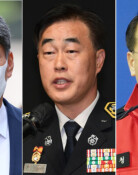The source of falsified government e-mails should be tracked down
The source of falsified government e-mails should be tracked down
Posted November. 30, 2018 07:39,
Updated November. 30, 2018 07:39
A few days ago, a business daily cancelled two articles titled "Serious deterioration of South Korea-U.S. relations, confesses a presidential official" that were published on the first and third pages of its paper. The cancellation was made because the reports proved to be false documents that were impersonated as a presidential secretary for national security and distributed via a false e-mail account. Earlier this year, a falsified e-mail titled "Submit materials for North Korea Policy" under the name of presidential secretary for information and policy monitoring Yun Gun-yung, was sent to government officials. Similarly in June, a false e-mail with a forged sender name by the head of the Korea Foundation, which contained content of the government’s doubts towards North Korea’s denuclearization, was sent to news reporters.
Of course, such false mails are nothing new. But the recent events should not be overlooked, considering the similarity of their creation and distribution methods. It appeared so authentic that the media believed and reported as major news. The presidential office Cheong Wa Dae found that someone had deliberately created Yun’s account and distributed false e-mails, but unable to track down the source, as the communication was done by a server outside of the country.
Another curious fact is that the contents focus on North Korea policies and South Korea-U.S. relations. This can be suspected that attempts are made to disturb President Moon’s policy towards North Korea. Cheong Wa Dae defined such action as “anti-state activities to undermine and alienate South Korea-U.S. relations” and requested police investigation.
There are grounds to suspect that the content and distribution methods of the falsified e-mails may be attempts to steal confidential information. We cannot rule out the possibility of an organized hacking attempt by North Korea or China. However, it is questionable whether the event should be viewed as an “anti-state activity” when no real information is known. Priority should be placed on promoting internal security and carrying out investigations into the case.







